Report on Management and Leadership in Vodafone's Operations
VerifiedAdded on 2020/10/22
|14
|4163
|286
Report
AI Summary
This report provides a comprehensive analysis of management and leadership within Vodafone, a leading global telecommunications company. It begins by defining the roles and characteristics of both managers and leaders, highlighting the key differences between management and leadership styles. The report then explores the application of different management and leadership styles, supported by relevant theories and concepts, specifically focusing on situational leadership, the Hersey-Blanchard model, and management by objectives (MBO). The report examines how these theories can be applied to various organizational situations within Vodafone, contributing to organizational growth and sustainable performance. Furthermore, it discusses the application of theories in organizational growth and sustainable performance. Finally, it delves into the key approaches of operations management, its importance and value in achieving Vodafone's objectives, and the factors affecting operational management and decision-making by leaders and managers. This report offers valuable insights into the practical application of management and leadership principles within a real-world business context, providing a detailed overview of the content.
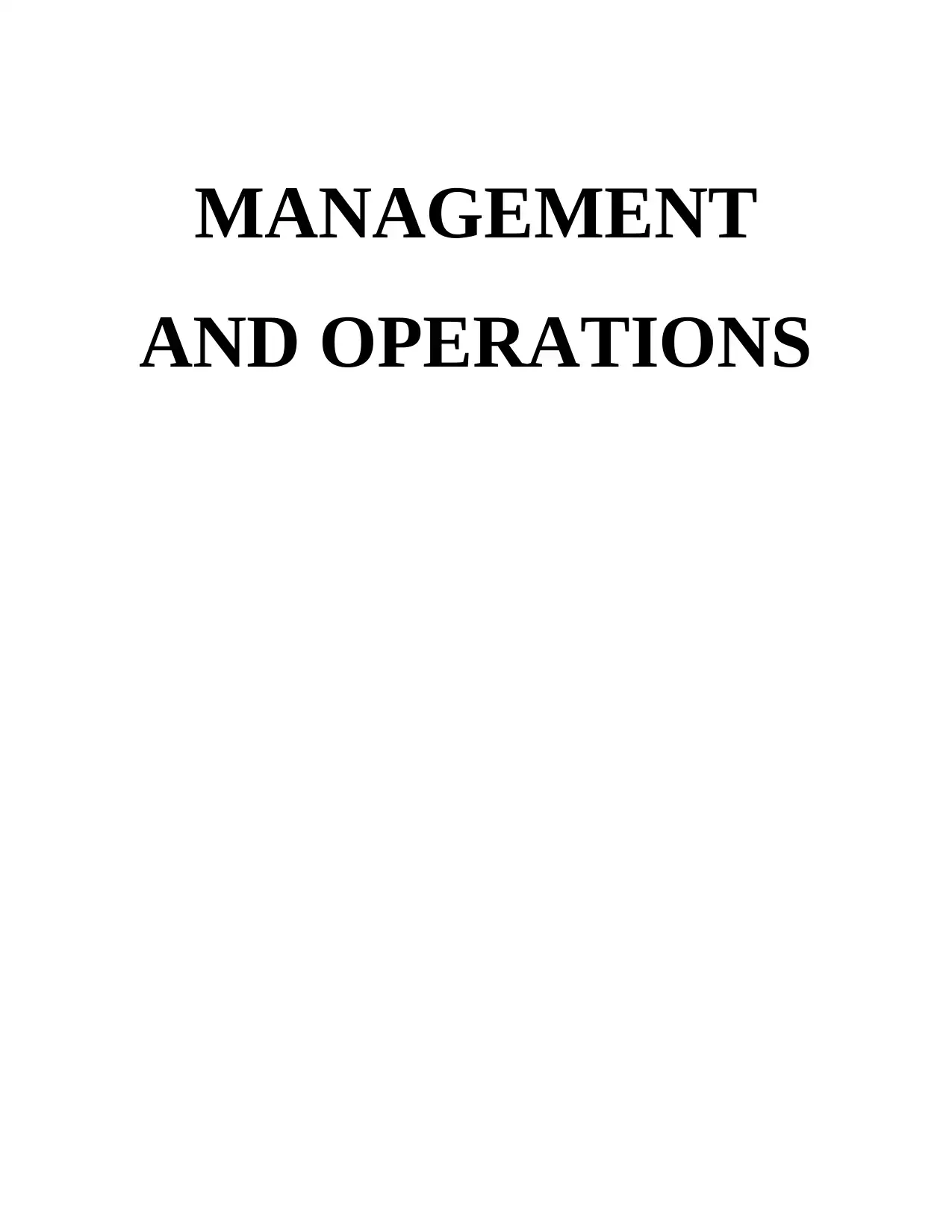
MANAGEMENT
AND OPERATIONS
AND OPERATIONS
Paraphrase This Document
Need a fresh take? Get an instant paraphrase of this document with our AI Paraphraser
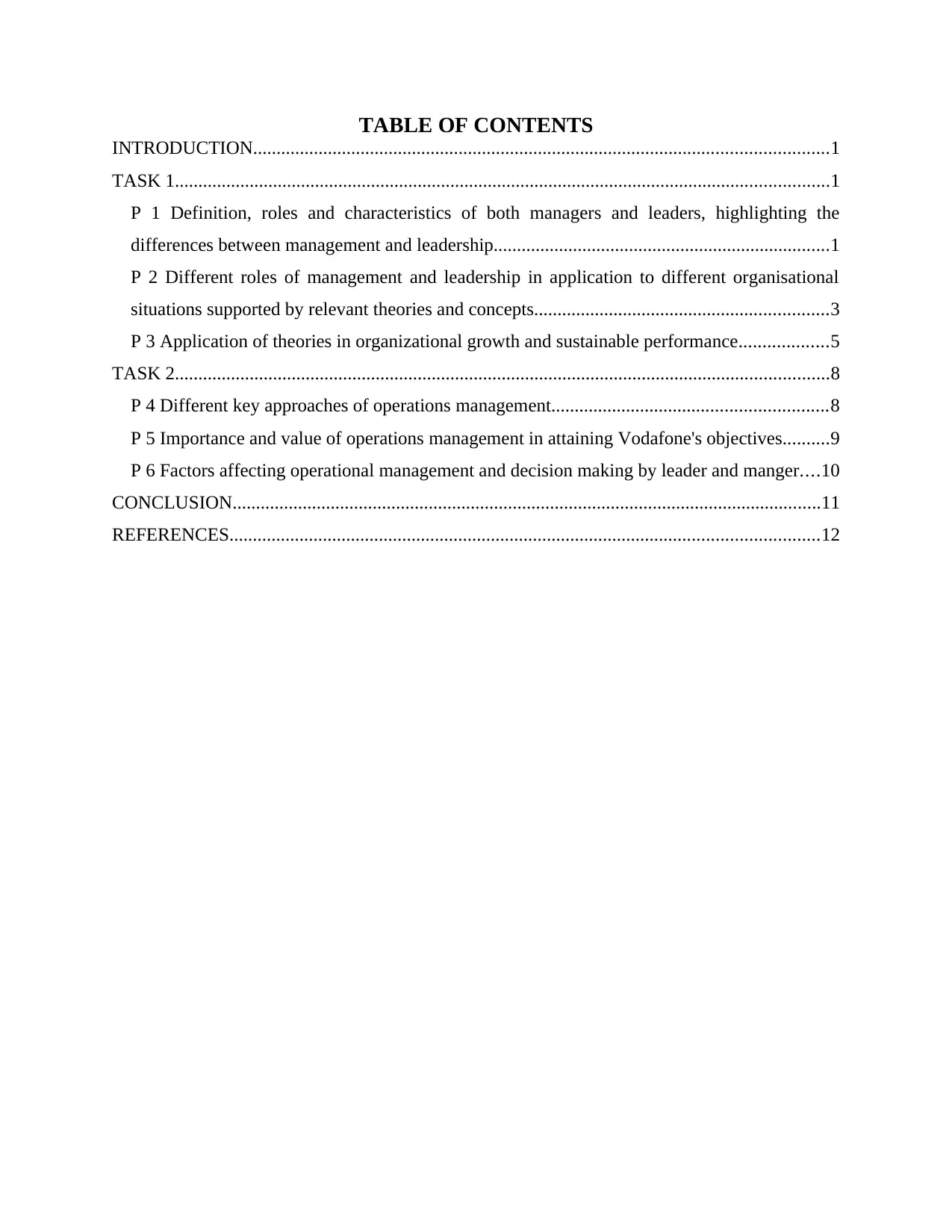
TABLE OF CONTENTS
INTRODUCTION...........................................................................................................................1
TASK 1............................................................................................................................................1
P 1 Definition, roles and characteristics of both managers and leaders, highlighting the
differences between management and leadership........................................................................1
P 2 Different roles of management and leadership in application to different organisational
situations supported by relevant theories and concepts...............................................................3
P 3 Application of theories in organizational growth and sustainable performance...................5
TASK 2............................................................................................................................................8
P 4 Different key approaches of operations management...........................................................8
P 5 Importance and value of operations management in attaining Vodafone's objectives..........9
P 6 Factors affecting operational management and decision making by leader and manger....10
CONCLUSION..............................................................................................................................11
REFERENCES..............................................................................................................................12
INTRODUCTION...........................................................................................................................1
TASK 1............................................................................................................................................1
P 1 Definition, roles and characteristics of both managers and leaders, highlighting the
differences between management and leadership........................................................................1
P 2 Different roles of management and leadership in application to different organisational
situations supported by relevant theories and concepts...............................................................3
P 3 Application of theories in organizational growth and sustainable performance...................5
TASK 2............................................................................................................................................8
P 4 Different key approaches of operations management...........................................................8
P 5 Importance and value of operations management in attaining Vodafone's objectives..........9
P 6 Factors affecting operational management and decision making by leader and manger....10
CONCLUSION..............................................................................................................................11
REFERENCES..............................................................................................................................12
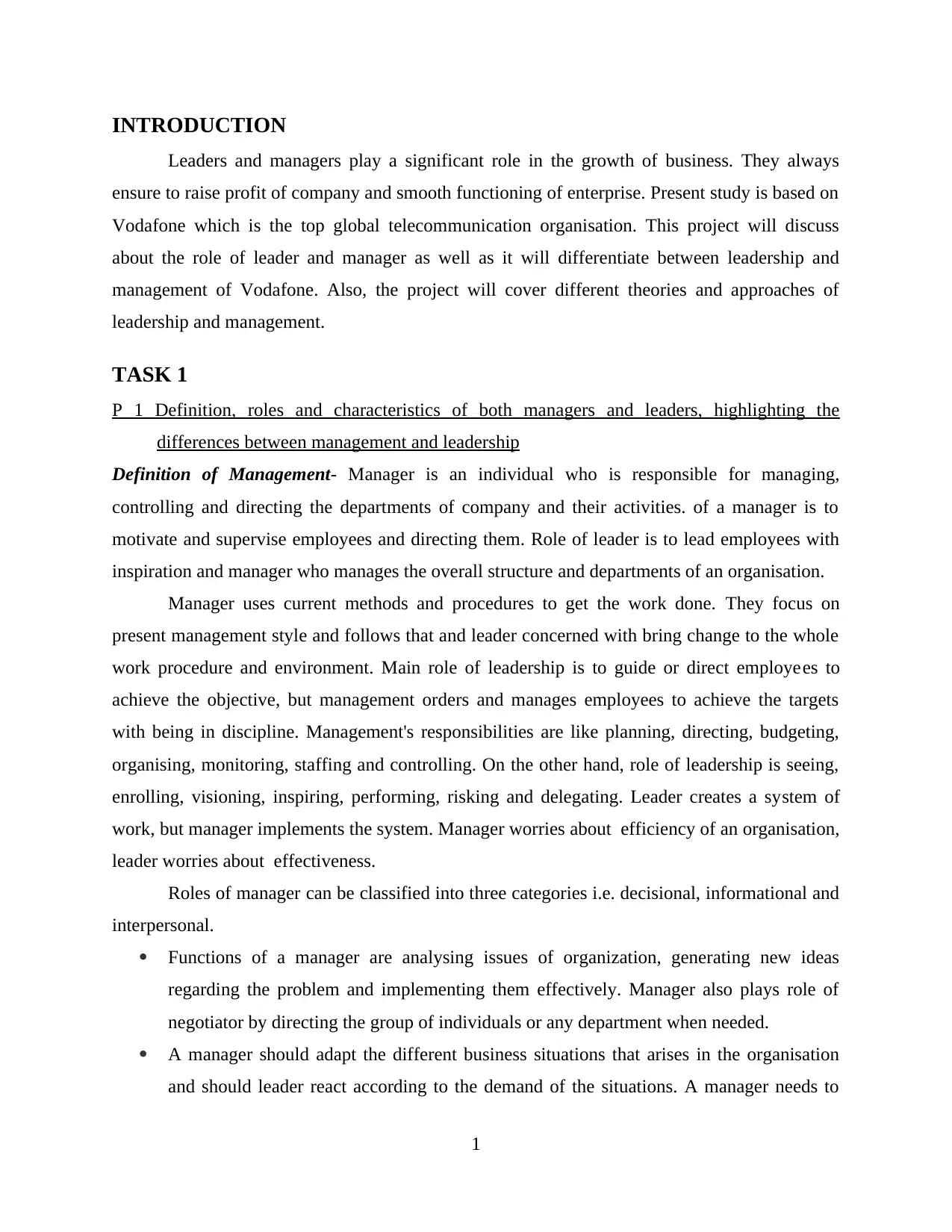
INTRODUCTION
Leaders and managers play a significant role in the growth of business. They always
ensure to raise profit of company and smooth functioning of enterprise. Present study is based on
Vodafone which is the top global telecommunication organisation. This project will discuss
about the role of leader and manager as well as it will differentiate between leadership and
management of Vodafone. Also, the project will cover different theories and approaches of
leadership and management.
TASK 1
P 1 Definition, roles and characteristics of both managers and leaders, highlighting the
differences between management and leadership
Definition of Management- Manager is an individual who is responsible for managing,
controlling and directing the departments of company and their activities. of a manager is to
motivate and supervise employees and directing them. Role of leader is to lead employees with
inspiration and manager who manages the overall structure and departments of an organisation.
Manager uses current methods and procedures to get the work done. They focus on
present management style and follows that and leader concerned with bring change to the whole
work procedure and environment. Main role of leadership is to guide or direct employees to
achieve the objective, but management orders and manages employees to achieve the targets
with being in discipline. Management's responsibilities are like planning, directing, budgeting,
organising, monitoring, staffing and controlling. On the other hand, role of leadership is seeing,
enrolling, visioning, inspiring, performing, risking and delegating. Leader creates a system of
work, but manager implements the system. Manager worries about efficiency of an organisation,
leader worries about effectiveness.
Roles of manager can be classified into three categories i.e. decisional, informational and
interpersonal.
Functions of a manager are analysing issues of organization, generating new ideas
regarding the problem and implementing them effectively. Manager also plays role of
negotiator by directing the group of individuals or any department when needed.
A manager should adapt the different business situations that arises in the organisation
and should leader react according to the demand of the situations. A manager needs to
1
Leaders and managers play a significant role in the growth of business. They always
ensure to raise profit of company and smooth functioning of enterprise. Present study is based on
Vodafone which is the top global telecommunication organisation. This project will discuss
about the role of leader and manager as well as it will differentiate between leadership and
management of Vodafone. Also, the project will cover different theories and approaches of
leadership and management.
TASK 1
P 1 Definition, roles and characteristics of both managers and leaders, highlighting the
differences between management and leadership
Definition of Management- Manager is an individual who is responsible for managing,
controlling and directing the departments of company and their activities. of a manager is to
motivate and supervise employees and directing them. Role of leader is to lead employees with
inspiration and manager who manages the overall structure and departments of an organisation.
Manager uses current methods and procedures to get the work done. They focus on
present management style and follows that and leader concerned with bring change to the whole
work procedure and environment. Main role of leadership is to guide or direct employees to
achieve the objective, but management orders and manages employees to achieve the targets
with being in discipline. Management's responsibilities are like planning, directing, budgeting,
organising, monitoring, staffing and controlling. On the other hand, role of leadership is seeing,
enrolling, visioning, inspiring, performing, risking and delegating. Leader creates a system of
work, but manager implements the system. Manager worries about efficiency of an organisation,
leader worries about effectiveness.
Roles of manager can be classified into three categories i.e. decisional, informational and
interpersonal.
Functions of a manager are analysing issues of organization, generating new ideas
regarding the problem and implementing them effectively. Manager also plays role of
negotiator by directing the group of individuals or any department when needed.
A manager should adapt the different business situations that arises in the organisation
and should leader react according to the demand of the situations. A manager needs to
1
⊘ This is a preview!⊘
Do you want full access?
Subscribe today to unlock all pages.

Trusted by 1+ million students worldwide
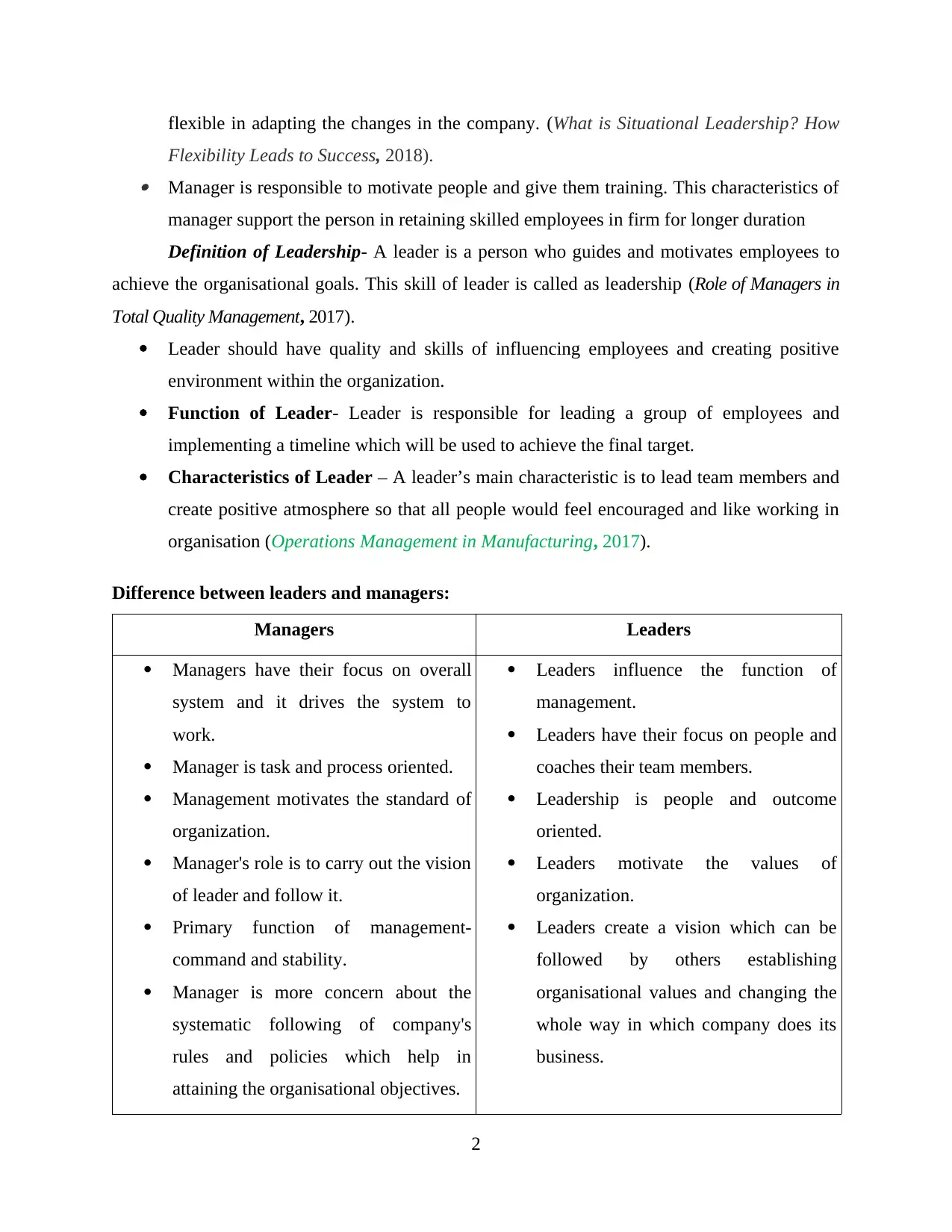
flexible in adapting the changes in the company. (What is Situational Leadership? How
Flexibility Leads to Success, 2018). Manager is responsible to motivate people and give them training. This characteristics of
manager support the person in retaining skilled employees in firm for longer duration
Definition of Leadership- A leader is a person who guides and motivates employees to
achieve the organisational goals. This skill of leader is called as leadership (Role of Managers in
Total Quality Management, 2017).
Leader should have quality and skills of influencing employees and creating positive
environment within the organization.
Function of Leader- Leader is responsible for leading a group of employees and
implementing a timeline which will be used to achieve the final target.
Characteristics of Leader – A leader’s main characteristic is to lead team members and
create positive atmosphere so that all people would feel encouraged and like working in
organisation (Operations Management in Manufacturing, 2017).
Difference between leaders and managers:
Managers Leaders
Managers have their focus on overall
system and it drives the system to
work.
Manager is task and process oriented.
Management motivates the standard of
organization.
Manager's role is to carry out the vision
of leader and follow it.
Primary function of management-
command and stability.
Manager is more concern about the
systematic following of company's
rules and policies which help in
attaining the organisational objectives.
Leaders influence the function of
management.
Leaders have their focus on people and
coaches their team members.
Leadership is people and outcome
oriented.
Leaders motivate the values of
organization.
Leaders create a vision which can be
followed by others establishing
organisational values and changing the
whole way in which company does its
business.
2
Flexibility Leads to Success, 2018). Manager is responsible to motivate people and give them training. This characteristics of
manager support the person in retaining skilled employees in firm for longer duration
Definition of Leadership- A leader is a person who guides and motivates employees to
achieve the organisational goals. This skill of leader is called as leadership (Role of Managers in
Total Quality Management, 2017).
Leader should have quality and skills of influencing employees and creating positive
environment within the organization.
Function of Leader- Leader is responsible for leading a group of employees and
implementing a timeline which will be used to achieve the final target.
Characteristics of Leader – A leader’s main characteristic is to lead team members and
create positive atmosphere so that all people would feel encouraged and like working in
organisation (Operations Management in Manufacturing, 2017).
Difference between leaders and managers:
Managers Leaders
Managers have their focus on overall
system and it drives the system to
work.
Manager is task and process oriented.
Management motivates the standard of
organization.
Manager's role is to carry out the vision
of leader and follow it.
Primary function of management-
command and stability.
Manager is more concern about the
systematic following of company's
rules and policies which help in
attaining the organisational objectives.
Leaders influence the function of
management.
Leaders have their focus on people and
coaches their team members.
Leadership is people and outcome
oriented.
Leaders motivate the values of
organization.
Leaders create a vision which can be
followed by others establishing
organisational values and changing the
whole way in which company does its
business.
2
Paraphrase This Document
Need a fresh take? Get an instant paraphrase of this document with our AI Paraphraser
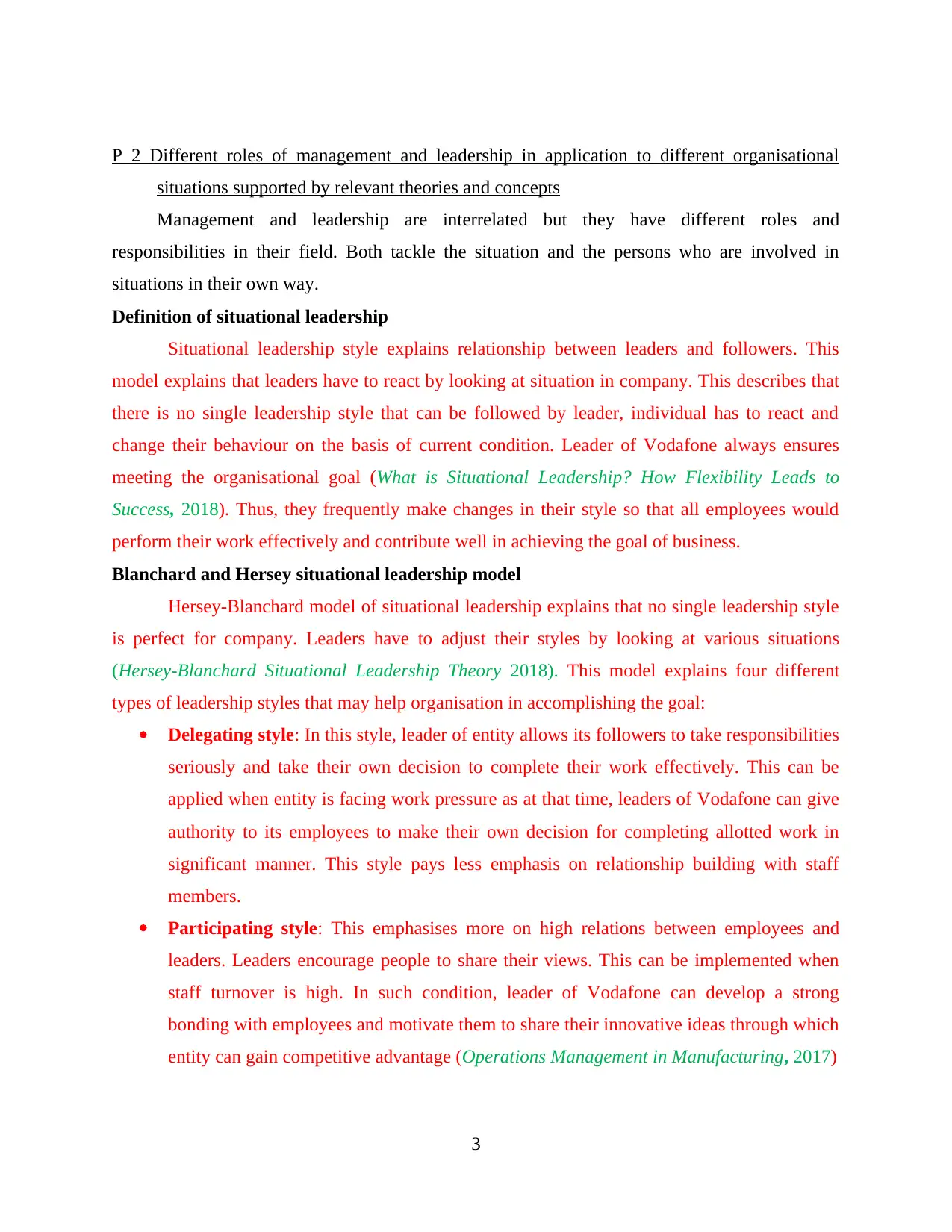
P 2 Different roles of management and leadership in application to different organisational
situations supported by relevant theories and concepts
Management and leadership are interrelated but they have different roles and
responsibilities in their field. Both tackle the situation and the persons who are involved in
situations in their own way.
Definition of situational leadership
Situational leadership style explains relationship between leaders and followers. This
model explains that leaders have to react by looking at situation in company. This describes that
there is no single leadership style that can be followed by leader, individual has to react and
change their behaviour on the basis of current condition. Leader of Vodafone always ensures
meeting the organisational goal (What is Situational Leadership? How Flexibility Leads to
Success, 2018). Thus, they frequently make changes in their style so that all employees would
perform their work effectively and contribute well in achieving the goal of business.
Blanchard and Hersey situational leadership model
Hersey-Blanchard model of situational leadership explains that no single leadership style
is perfect for company. Leaders have to adjust their styles by looking at various situations
(Hersey-Blanchard Situational Leadership Theory 2018). This model explains four different
types of leadership styles that may help organisation in accomplishing the goal:
Delegating style: In this style, leader of entity allows its followers to take responsibilities
seriously and take their own decision to complete their work effectively. This can be
applied when entity is facing work pressure as at that time, leaders of Vodafone can give
authority to its employees to make their own decision for completing allotted work in
significant manner. This style pays less emphasis on relationship building with staff
members.
Participating style: This emphasises more on high relations between employees and
leaders. Leaders encourage people to share their views. This can be implemented when
staff turnover is high. In such condition, leader of Vodafone can develop a strong
bonding with employees and motivate them to share their innovative ideas through which
entity can gain competitive advantage (Operations Management in Manufacturing, 2017)
3
situations supported by relevant theories and concepts
Management and leadership are interrelated but they have different roles and
responsibilities in their field. Both tackle the situation and the persons who are involved in
situations in their own way.
Definition of situational leadership
Situational leadership style explains relationship between leaders and followers. This
model explains that leaders have to react by looking at situation in company. This describes that
there is no single leadership style that can be followed by leader, individual has to react and
change their behaviour on the basis of current condition. Leader of Vodafone always ensures
meeting the organisational goal (What is Situational Leadership? How Flexibility Leads to
Success, 2018). Thus, they frequently make changes in their style so that all employees would
perform their work effectively and contribute well in achieving the goal of business.
Blanchard and Hersey situational leadership model
Hersey-Blanchard model of situational leadership explains that no single leadership style
is perfect for company. Leaders have to adjust their styles by looking at various situations
(Hersey-Blanchard Situational Leadership Theory 2018). This model explains four different
types of leadership styles that may help organisation in accomplishing the goal:
Delegating style: In this style, leader of entity allows its followers to take responsibilities
seriously and take their own decision to complete their work effectively. This can be
applied when entity is facing work pressure as at that time, leaders of Vodafone can give
authority to its employees to make their own decision for completing allotted work in
significant manner. This style pays less emphasis on relationship building with staff
members.
Participating style: This emphasises more on high relations between employees and
leaders. Leaders encourage people to share their views. This can be implemented when
staff turnover is high. In such condition, leader of Vodafone can develop a strong
bonding with employees and motivate them to share their innovative ideas through which
entity can gain competitive advantage (Operations Management in Manufacturing, 2017)
3
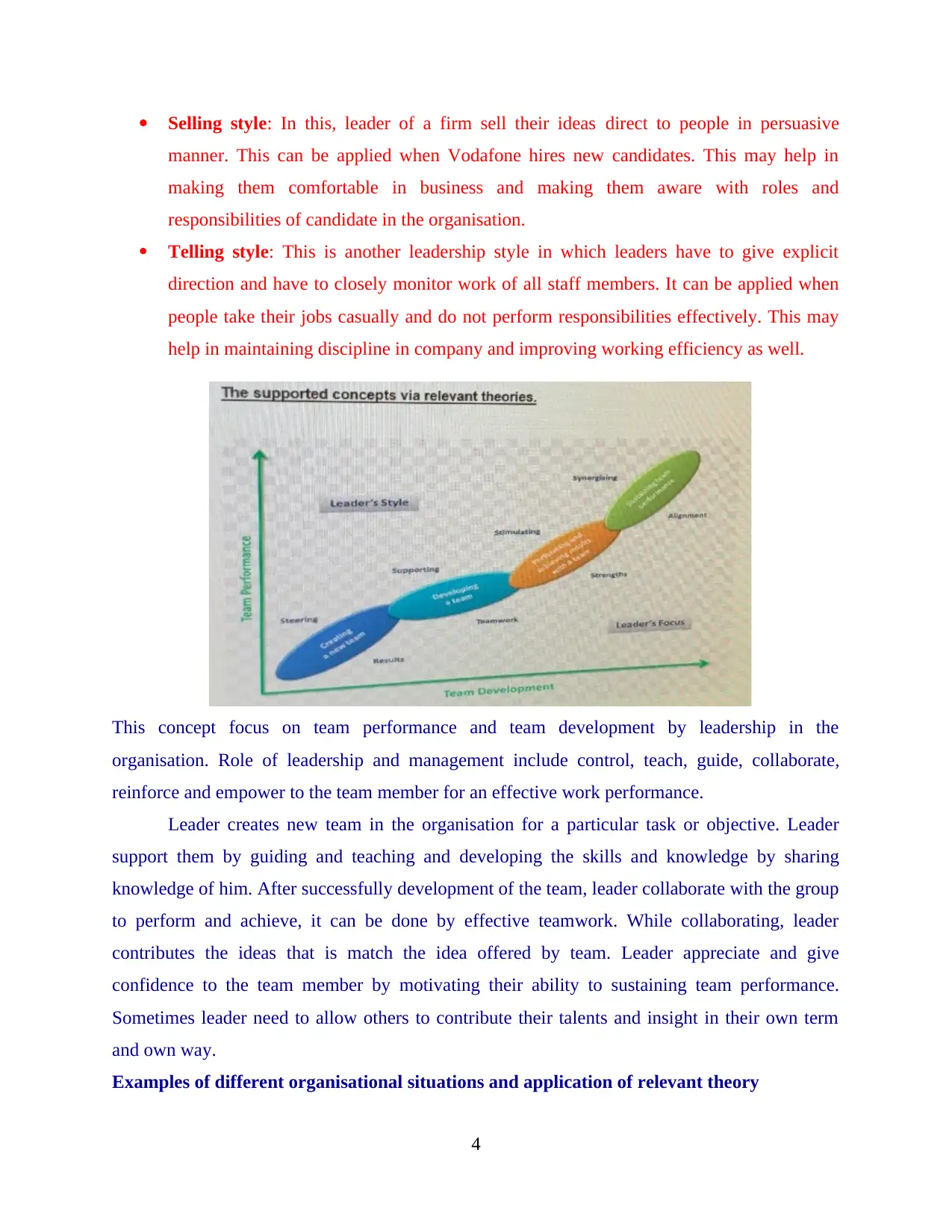
Selling style: In this, leader of a firm sell their ideas direct to people in persuasive
manner. This can be applied when Vodafone hires new candidates. This may help in
making them comfortable in business and making them aware with roles and
responsibilities of candidate in the organisation.
Telling style: This is another leadership style in which leaders have to give explicit
direction and have to closely monitor work of all staff members. It can be applied when
people take their jobs casually and do not perform responsibilities effectively. This may
help in maintaining discipline in company and improving working efficiency as well.
This concept focus on team performance and team development by leadership in the
organisation. Role of leadership and management include control, teach, guide, collaborate,
reinforce and empower to the team member for an effective work performance.
Leader creates new team in the organisation for a particular task or objective. Leader
support them by guiding and teaching and developing the skills and knowledge by sharing
knowledge of him. After successfully development of the team, leader collaborate with the group
to perform and achieve, it can be done by effective teamwork. While collaborating, leader
contributes the ideas that is match the idea offered by team. Leader appreciate and give
confidence to the team member by motivating their ability to sustaining team performance.
Sometimes leader need to allow others to contribute their talents and insight in their own term
and own way.
Examples of different organisational situations and application of relevant theory
4
manner. This can be applied when Vodafone hires new candidates. This may help in
making them comfortable in business and making them aware with roles and
responsibilities of candidate in the organisation.
Telling style: This is another leadership style in which leaders have to give explicit
direction and have to closely monitor work of all staff members. It can be applied when
people take their jobs casually and do not perform responsibilities effectively. This may
help in maintaining discipline in company and improving working efficiency as well.
This concept focus on team performance and team development by leadership in the
organisation. Role of leadership and management include control, teach, guide, collaborate,
reinforce and empower to the team member for an effective work performance.
Leader creates new team in the organisation for a particular task or objective. Leader
support them by guiding and teaching and developing the skills and knowledge by sharing
knowledge of him. After successfully development of the team, leader collaborate with the group
to perform and achieve, it can be done by effective teamwork. While collaborating, leader
contributes the ideas that is match the idea offered by team. Leader appreciate and give
confidence to the team member by motivating their ability to sustaining team performance.
Sometimes leader need to allow others to contribute their talents and insight in their own term
and own way.
Examples of different organisational situations and application of relevant theory
4
⊘ This is a preview!⊘
Do you want full access?
Subscribe today to unlock all pages.

Trusted by 1+ million students worldwide
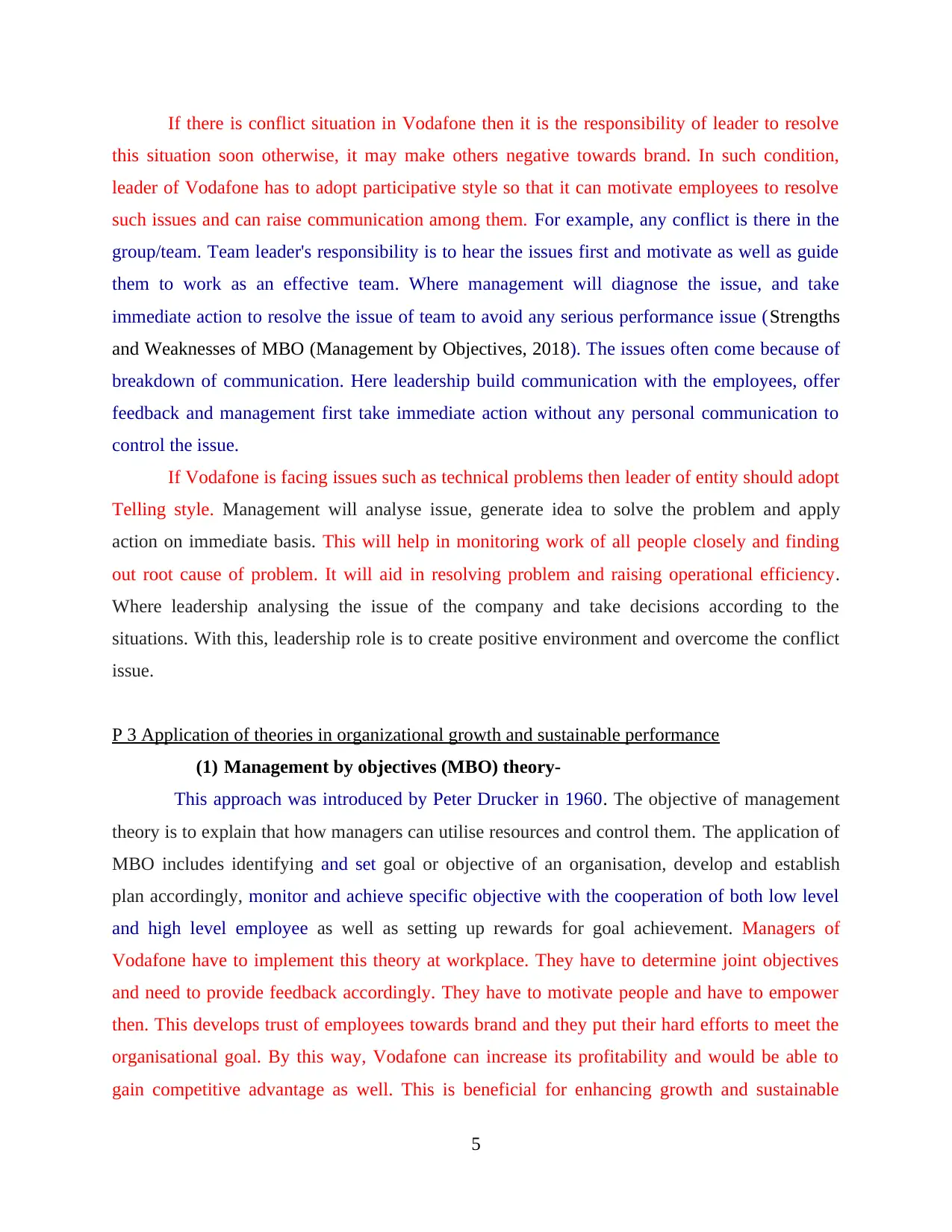
If there is conflict situation in Vodafone then it is the responsibility of leader to resolve
this situation soon otherwise, it may make others negative towards brand. In such condition,
leader of Vodafone has to adopt participative style so that it can motivate employees to resolve
such issues and can raise communication among them. For example, any conflict is there in the
group/team. Team leader's responsibility is to hear the issues first and motivate as well as guide
them to work as an effective team. Where management will diagnose the issue, and take
immediate action to resolve the issue of team to avoid any serious performance issue (Strengths
and Weaknesses of MBO (Management by Objectives, 2018). The issues often come because of
breakdown of communication. Here leadership build communication with the employees, offer
feedback and management first take immediate action without any personal communication to
control the issue.
If Vodafone is facing issues such as technical problems then leader of entity should adopt
Telling style. Management will analyse issue, generate idea to solve the problem and apply
action on immediate basis. This will help in monitoring work of all people closely and finding
out root cause of problem. It will aid in resolving problem and raising operational efficiency.
Where leadership analysing the issue of the company and take decisions according to the
situations. With this, leadership role is to create positive environment and overcome the conflict
issue.
P 3 Application of theories in organizational growth and sustainable performance
(1) Management by objectives (MBO) theory-
This approach was introduced by Peter Drucker in 1960. The objective of management
theory is to explain that how managers can utilise resources and control them. The application of
MBO includes identifying and set goal or objective of an organisation, develop and establish
plan accordingly, monitor and achieve specific objective with the cooperation of both low level
and high level employee as well as setting up rewards for goal achievement. Managers of
Vodafone have to implement this theory at workplace. They have to determine joint objectives
and need to provide feedback accordingly. They have to motivate people and have to empower
then. This develops trust of employees towards brand and they put their hard efforts to meet the
organisational goal. By this way, Vodafone can increase its profitability and would be able to
gain competitive advantage as well. This is beneficial for enhancing growth and sustainable
5
this situation soon otherwise, it may make others negative towards brand. In such condition,
leader of Vodafone has to adopt participative style so that it can motivate employees to resolve
such issues and can raise communication among them. For example, any conflict is there in the
group/team. Team leader's responsibility is to hear the issues first and motivate as well as guide
them to work as an effective team. Where management will diagnose the issue, and take
immediate action to resolve the issue of team to avoid any serious performance issue (Strengths
and Weaknesses of MBO (Management by Objectives, 2018). The issues often come because of
breakdown of communication. Here leadership build communication with the employees, offer
feedback and management first take immediate action without any personal communication to
control the issue.
If Vodafone is facing issues such as technical problems then leader of entity should adopt
Telling style. Management will analyse issue, generate idea to solve the problem and apply
action on immediate basis. This will help in monitoring work of all people closely and finding
out root cause of problem. It will aid in resolving problem and raising operational efficiency.
Where leadership analysing the issue of the company and take decisions according to the
situations. With this, leadership role is to create positive environment and overcome the conflict
issue.
P 3 Application of theories in organizational growth and sustainable performance
(1) Management by objectives (MBO) theory-
This approach was introduced by Peter Drucker in 1960. The objective of management
theory is to explain that how managers can utilise resources and control them. The application of
MBO includes identifying and set goal or objective of an organisation, develop and establish
plan accordingly, monitor and achieve specific objective with the cooperation of both low level
and high level employee as well as setting up rewards for goal achievement. Managers of
Vodafone have to implement this theory at workplace. They have to determine joint objectives
and need to provide feedback accordingly. They have to motivate people and have to empower
then. This develops trust of employees towards brand and they put their hard efforts to meet the
organisational goal. By this way, Vodafone can increase its profitability and would be able to
gain competitive advantage as well. This is beneficial for enhancing growth and sustainable
5
Paraphrase This Document
Need a fresh take? Get an instant paraphrase of this document with our AI Paraphraser
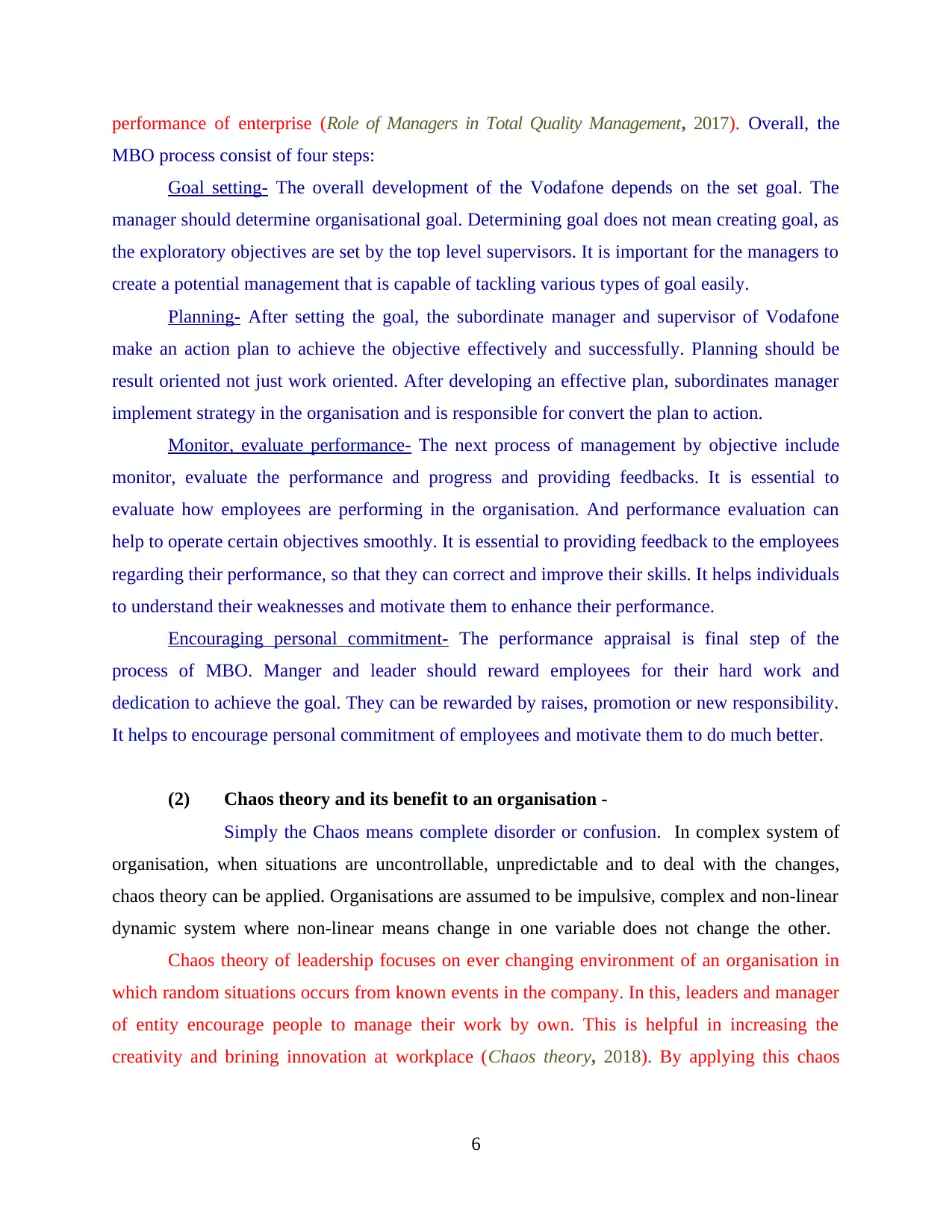
performance of enterprise (Role of Managers in Total Quality Management, 2017). Overall, the
MBO process consist of four steps:
Goal setting- The overall development of the Vodafone depends on the set goal. The
manager should determine organisational goal. Determining goal does not mean creating goal, as
the exploratory objectives are set by the top level supervisors. It is important for the managers to
create a potential management that is capable of tackling various types of goal easily.
Planning- After setting the goal, the subordinate manager and supervisor of Vodafone
make an action plan to achieve the objective effectively and successfully. Planning should be
result oriented not just work oriented. After developing an effective plan, subordinates manager
implement strategy in the organisation and is responsible for convert the plan to action.
Monitor, evaluate performance- The next process of management by objective include
monitor, evaluate the performance and progress and providing feedbacks. It is essential to
evaluate how employees are performing in the organisation. And performance evaluation can
help to operate certain objectives smoothly. It is essential to providing feedback to the employees
regarding their performance, so that they can correct and improve their skills. It helps individuals
to understand their weaknesses and motivate them to enhance their performance.
Encouraging personal commitment- The performance appraisal is final step of the
process of MBO. Manger and leader should reward employees for their hard work and
dedication to achieve the goal. They can be rewarded by raises, promotion or new responsibility.
It helps to encourage personal commitment of employees and motivate them to do much better.
(2) Chaos theory and its benefit to an organisation -
Simply the Chaos means complete disorder or confusion. In complex system of
organisation, when situations are uncontrollable, unpredictable and to deal with the changes,
chaos theory can be applied. Organisations are assumed to be impulsive, complex and non-linear
dynamic system where non-linear means change in one variable does not change the other.
Chaos theory of leadership focuses on ever changing environment of an organisation in
which random situations occurs from known events in the company. In this, leaders and manager
of entity encourage people to manage their work by own. This is helpful in increasing the
creativity and brining innovation at workplace (Chaos theory, 2018). By applying this chaos
6
MBO process consist of four steps:
Goal setting- The overall development of the Vodafone depends on the set goal. The
manager should determine organisational goal. Determining goal does not mean creating goal, as
the exploratory objectives are set by the top level supervisors. It is important for the managers to
create a potential management that is capable of tackling various types of goal easily.
Planning- After setting the goal, the subordinate manager and supervisor of Vodafone
make an action plan to achieve the objective effectively and successfully. Planning should be
result oriented not just work oriented. After developing an effective plan, subordinates manager
implement strategy in the organisation and is responsible for convert the plan to action.
Monitor, evaluate performance- The next process of management by objective include
monitor, evaluate the performance and progress and providing feedbacks. It is essential to
evaluate how employees are performing in the organisation. And performance evaluation can
help to operate certain objectives smoothly. It is essential to providing feedback to the employees
regarding their performance, so that they can correct and improve their skills. It helps individuals
to understand their weaknesses and motivate them to enhance their performance.
Encouraging personal commitment- The performance appraisal is final step of the
process of MBO. Manger and leader should reward employees for their hard work and
dedication to achieve the goal. They can be rewarded by raises, promotion or new responsibility.
It helps to encourage personal commitment of employees and motivate them to do much better.
(2) Chaos theory and its benefit to an organisation -
Simply the Chaos means complete disorder or confusion. In complex system of
organisation, when situations are uncontrollable, unpredictable and to deal with the changes,
chaos theory can be applied. Organisations are assumed to be impulsive, complex and non-linear
dynamic system where non-linear means change in one variable does not change the other.
Chaos theory of leadership focuses on ever changing environment of an organisation in
which random situations occurs from known events in the company. In this, leaders and manager
of entity encourage people to manage their work by own. This is helpful in increasing the
creativity and brining innovation at workplace (Chaos theory, 2018). By applying this chaos
6
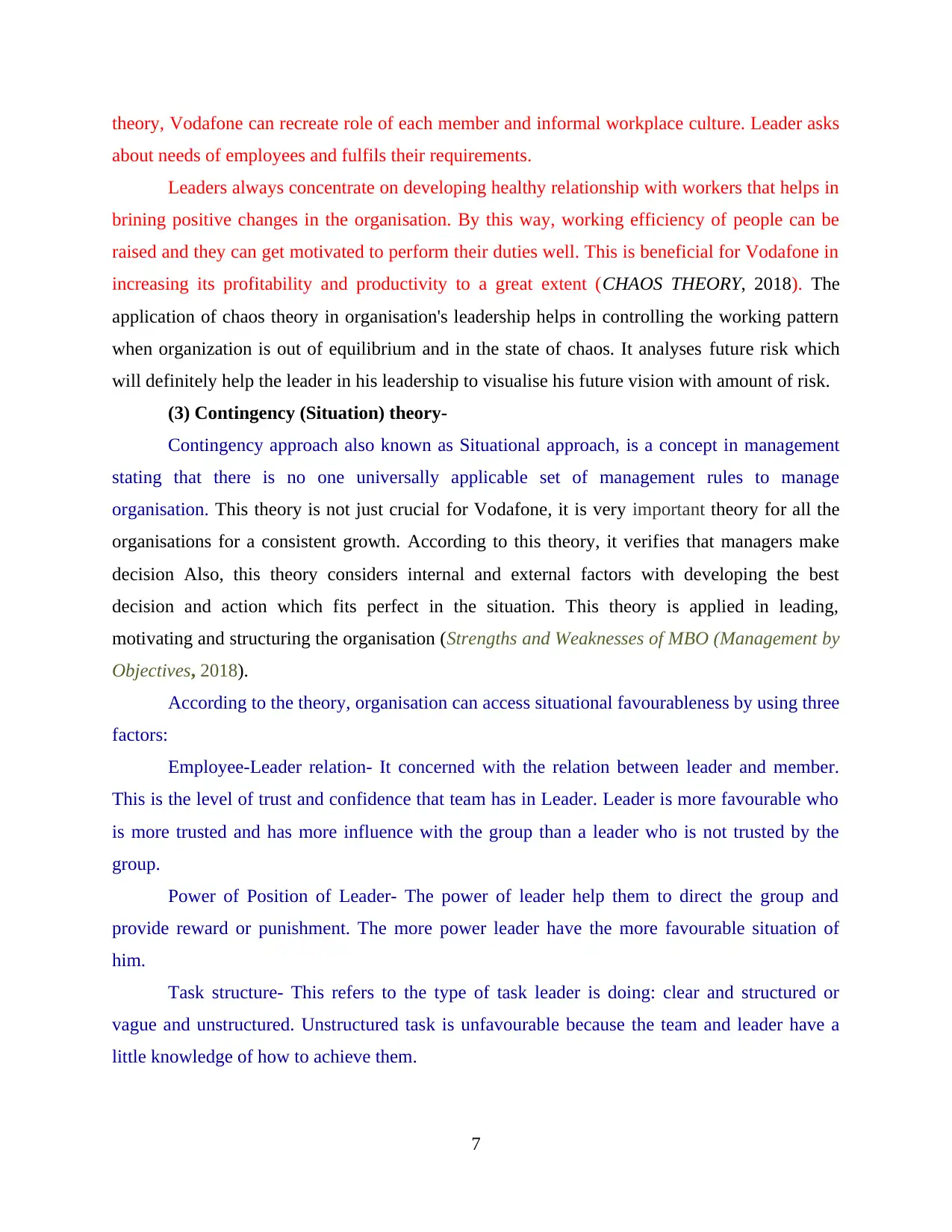
theory, Vodafone can recreate role of each member and informal workplace culture. Leader asks
about needs of employees and fulfils their requirements.
Leaders always concentrate on developing healthy relationship with workers that helps in
brining positive changes in the organisation. By this way, working efficiency of people can be
raised and they can get motivated to perform their duties well. This is beneficial for Vodafone in
increasing its profitability and productivity to a great extent (CHAOS THEORY, 2018). The
application of chaos theory in organisation's leadership helps in controlling the working pattern
when organization is out of equilibrium and in the state of chaos. It analyses future risk which
will definitely help the leader in his leadership to visualise his future vision with amount of risk.
(3) Contingency (Situation) theory-
Contingency approach also known as Situational approach, is a concept in management
stating that there is no one universally applicable set of management rules to manage
organisation. This theory is not just crucial for Vodafone, it is very important theory for all the
organisations for a consistent growth. According to this theory, it verifies that managers make
decision Also, this theory considers internal and external factors with developing the best
decision and action which fits perfect in the situation. This theory is applied in leading,
motivating and structuring the organisation (Strengths and Weaknesses of MBO (Management by
Objectives, 2018).
According to the theory, organisation can access situational favourableness by using three
factors:
Employee-Leader relation- It concerned with the relation between leader and member.
This is the level of trust and confidence that team has in Leader. Leader is more favourable who
is more trusted and has more influence with the group than a leader who is not trusted by the
group.
Power of Position of Leader- The power of leader help them to direct the group and
provide reward or punishment. The more power leader have the more favourable situation of
him.
Task structure- This refers to the type of task leader is doing: clear and structured or
vague and unstructured. Unstructured task is unfavourable because the team and leader have a
little knowledge of how to achieve them.
7
about needs of employees and fulfils their requirements.
Leaders always concentrate on developing healthy relationship with workers that helps in
brining positive changes in the organisation. By this way, working efficiency of people can be
raised and they can get motivated to perform their duties well. This is beneficial for Vodafone in
increasing its profitability and productivity to a great extent (CHAOS THEORY, 2018). The
application of chaos theory in organisation's leadership helps in controlling the working pattern
when organization is out of equilibrium and in the state of chaos. It analyses future risk which
will definitely help the leader in his leadership to visualise his future vision with amount of risk.
(3) Contingency (Situation) theory-
Contingency approach also known as Situational approach, is a concept in management
stating that there is no one universally applicable set of management rules to manage
organisation. This theory is not just crucial for Vodafone, it is very important theory for all the
organisations for a consistent growth. According to this theory, it verifies that managers make
decision Also, this theory considers internal and external factors with developing the best
decision and action which fits perfect in the situation. This theory is applied in leading,
motivating and structuring the organisation (Strengths and Weaknesses of MBO (Management by
Objectives, 2018).
According to the theory, organisation can access situational favourableness by using three
factors:
Employee-Leader relation- It concerned with the relation between leader and member.
This is the level of trust and confidence that team has in Leader. Leader is more favourable who
is more trusted and has more influence with the group than a leader who is not trusted by the
group.
Power of Position of Leader- The power of leader help them to direct the group and
provide reward or punishment. The more power leader have the more favourable situation of
him.
Task structure- This refers to the type of task leader is doing: clear and structured or
vague and unstructured. Unstructured task is unfavourable because the team and leader have a
little knowledge of how to achieve them.
7
⊘ This is a preview!⊘
Do you want full access?
Subscribe today to unlock all pages.

Trusted by 1+ million students worldwide
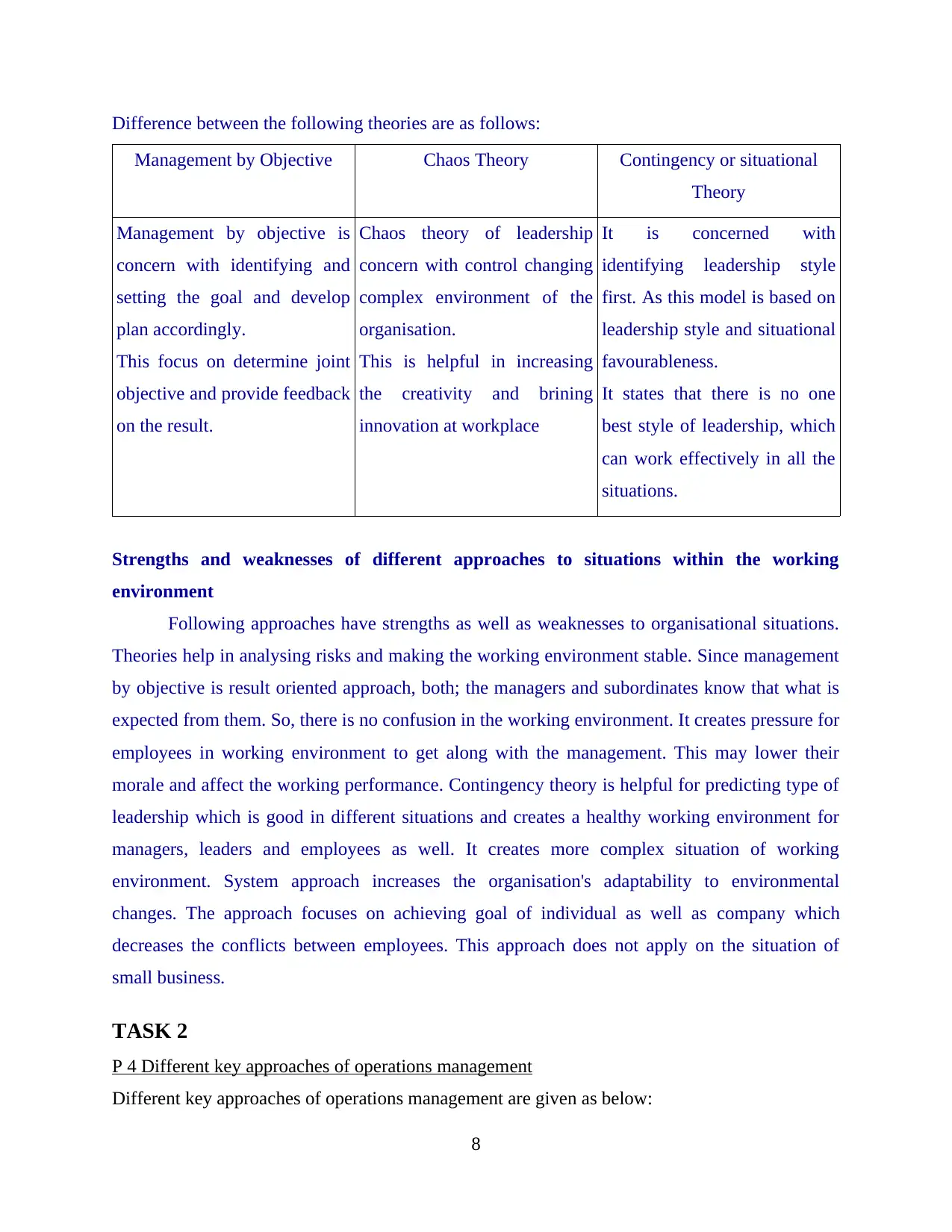
Difference between the following theories are as follows:
Management by Objective Chaos Theory Contingency or situational
Theory
Management by objective is
concern with identifying and
setting the goal and develop
plan accordingly.
This focus on determine joint
objective and provide feedback
on the result.
Chaos theory of leadership
concern with control changing
complex environment of the
organisation.
This is helpful in increasing
the creativity and brining
innovation at workplace
It is concerned with
identifying leadership style
first. As this model is based on
leadership style and situational
favourableness.
It states that there is no one
best style of leadership, which
can work effectively in all the
situations.
Strengths and weaknesses of different approaches to situations within the working
environment
Following approaches have strengths as well as weaknesses to organisational situations.
Theories help in analysing risks and making the working environment stable. Since management
by objective is result oriented approach, both; the managers and subordinates know that what is
expected from them. So, there is no confusion in the working environment. It creates pressure for
employees in working environment to get along with the management. This may lower their
morale and affect the working performance. Contingency theory is helpful for predicting type of
leadership which is good in different situations and creates a healthy working environment for
managers, leaders and employees as well. It creates more complex situation of working
environment. System approach increases the organisation's adaptability to environmental
changes. The approach focuses on achieving goal of individual as well as company which
decreases the conflicts between employees. This approach does not apply on the situation of
small business.
TASK 2
P 4 Different key approaches of operations management
Different key approaches of operations management are given as below:
8
Management by Objective Chaos Theory Contingency or situational
Theory
Management by objective is
concern with identifying and
setting the goal and develop
plan accordingly.
This focus on determine joint
objective and provide feedback
on the result.
Chaos theory of leadership
concern with control changing
complex environment of the
organisation.
This is helpful in increasing
the creativity and brining
innovation at workplace
It is concerned with
identifying leadership style
first. As this model is based on
leadership style and situational
favourableness.
It states that there is no one
best style of leadership, which
can work effectively in all the
situations.
Strengths and weaknesses of different approaches to situations within the working
environment
Following approaches have strengths as well as weaknesses to organisational situations.
Theories help in analysing risks and making the working environment stable. Since management
by objective is result oriented approach, both; the managers and subordinates know that what is
expected from them. So, there is no confusion in the working environment. It creates pressure for
employees in working environment to get along with the management. This may lower their
morale and affect the working performance. Contingency theory is helpful for predicting type of
leadership which is good in different situations and creates a healthy working environment for
managers, leaders and employees as well. It creates more complex situation of working
environment. System approach increases the organisation's adaptability to environmental
changes. The approach focuses on achieving goal of individual as well as company which
decreases the conflicts between employees. This approach does not apply on the situation of
small business.
TASK 2
P 4 Different key approaches of operations management
Different key approaches of operations management are given as below:
8
Paraphrase This Document
Need a fresh take? Get an instant paraphrase of this document with our AI Paraphraser
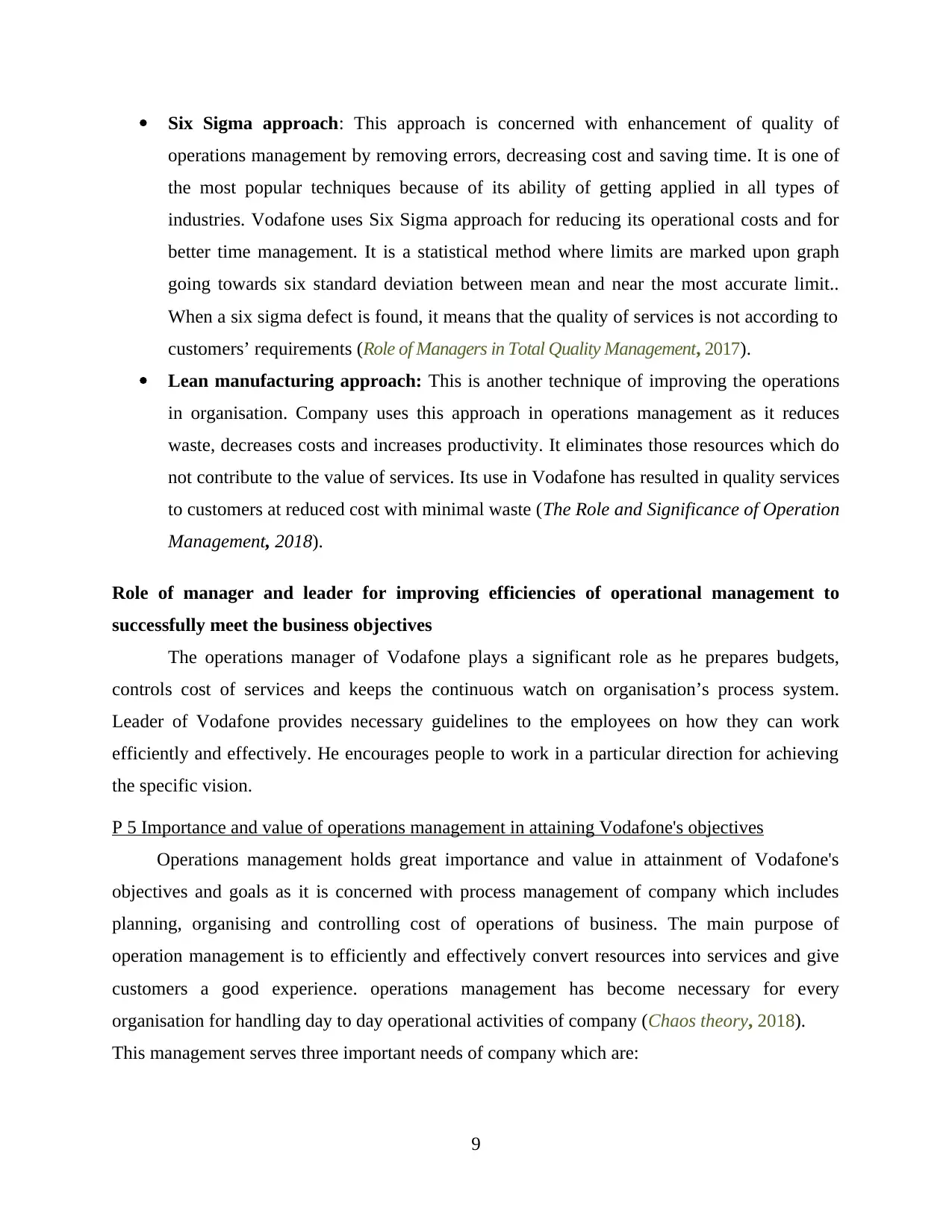
Six Sigma approach: This approach is concerned with enhancement of quality of
operations management by removing errors, decreasing cost and saving time. It is one of
the most popular techniques because of its ability of getting applied in all types of
industries. Vodafone uses Six Sigma approach for reducing its operational costs and for
better time management. It is a statistical method where limits are marked upon graph
going towards six standard deviation between mean and near the most accurate limit..
When a six sigma defect is found, it means that the quality of services is not according to
customers’ requirements (Role of Managers in Total Quality Management, 2017).
Lean manufacturing approach: This is another technique of improving the operations
in organisation. Company uses this approach in operations management as it reduces
waste, decreases costs and increases productivity. It eliminates those resources which do
not contribute to the value of services. Its use in Vodafone has resulted in quality services
to customers at reduced cost with minimal waste (The Role and Significance of Operation
Management, 2018).
Role of manager and leader for improving efficiencies of operational management to
successfully meet the business objectives
The operations manager of Vodafone plays a significant role as he prepares budgets,
controls cost of services and keeps the continuous watch on organisation’s process system.
Leader of Vodafone provides necessary guidelines to the employees on how they can work
efficiently and effectively. He encourages people to work in a particular direction for achieving
the specific vision.
P 5 Importance and value of operations management in attaining Vodafone's objectives
Operations management holds great importance and value in attainment of Vodafone's
objectives and goals as it is concerned with process management of company which includes
planning, organising and controlling cost of operations of business. The main purpose of
operation management is to efficiently and effectively convert resources into services and give
customers a good experience. operations management has become necessary for every
organisation for handling day to day operational activities of company (Chaos theory, 2018).
This management serves three important needs of company which are:
9
operations management by removing errors, decreasing cost and saving time. It is one of
the most popular techniques because of its ability of getting applied in all types of
industries. Vodafone uses Six Sigma approach for reducing its operational costs and for
better time management. It is a statistical method where limits are marked upon graph
going towards six standard deviation between mean and near the most accurate limit..
When a six sigma defect is found, it means that the quality of services is not according to
customers’ requirements (Role of Managers in Total Quality Management, 2017).
Lean manufacturing approach: This is another technique of improving the operations
in organisation. Company uses this approach in operations management as it reduces
waste, decreases costs and increases productivity. It eliminates those resources which do
not contribute to the value of services. Its use in Vodafone has resulted in quality services
to customers at reduced cost with minimal waste (The Role and Significance of Operation
Management, 2018).
Role of manager and leader for improving efficiencies of operational management to
successfully meet the business objectives
The operations manager of Vodafone plays a significant role as he prepares budgets,
controls cost of services and keeps the continuous watch on organisation’s process system.
Leader of Vodafone provides necessary guidelines to the employees on how they can work
efficiently and effectively. He encourages people to work in a particular direction for achieving
the specific vision.
P 5 Importance and value of operations management in attaining Vodafone's objectives
Operations management holds great importance and value in attainment of Vodafone's
objectives and goals as it is concerned with process management of company which includes
planning, organising and controlling cost of operations of business. The main purpose of
operation management is to efficiently and effectively convert resources into services and give
customers a good experience. operations management has become necessary for every
organisation for handling day to day operational activities of company (Chaos theory, 2018).
This management serves three important needs of company which are:
9
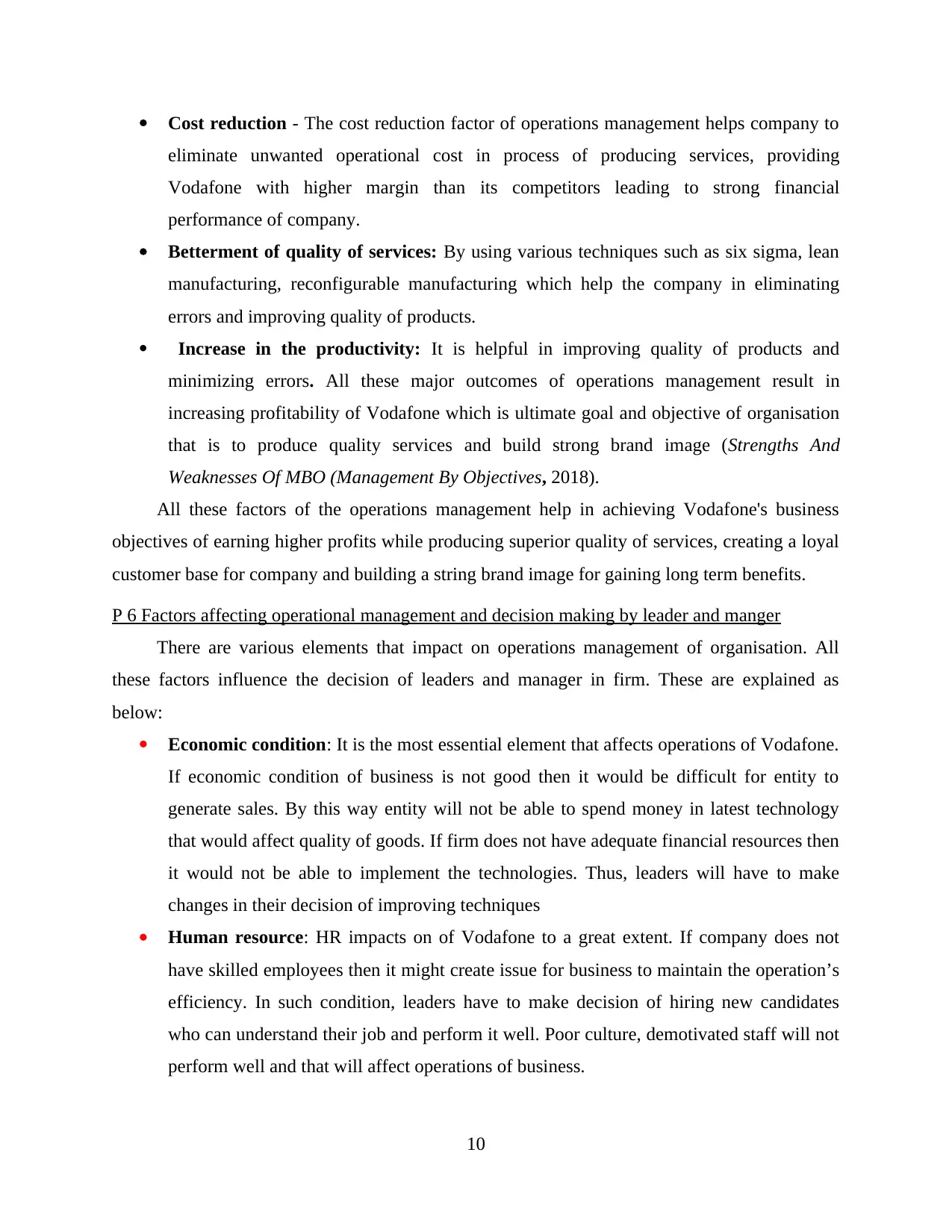
Cost reduction - The cost reduction factor of operations management helps company to
eliminate unwanted operational cost in process of producing services, providing
Vodafone with higher margin than its competitors leading to strong financial
performance of company.
Betterment of quality of services: By using various techniques such as six sigma, lean
manufacturing, reconfigurable manufacturing which help the company in eliminating
errors and improving quality of products.
Increase in the productivity: It is helpful in improving quality of products and
minimizing errors. All these major outcomes of operations management result in
increasing profitability of Vodafone which is ultimate goal and objective of organisation
that is to produce quality services and build strong brand image (Strengths And
Weaknesses Of MBO (Management By Objectives, 2018).
All these factors of the operations management help in achieving Vodafone's business
objectives of earning higher profits while producing superior quality of services, creating a loyal
customer base for company and building a string brand image for gaining long term benefits.
P 6 Factors affecting operational management and decision making by leader and manger
There are various elements that impact on operations management of organisation. All
these factors influence the decision of leaders and manager in firm. These are explained as
below:
Economic condition: It is the most essential element that affects operations of Vodafone.
If economic condition of business is not good then it would be difficult for entity to
generate sales. By this way entity will not be able to spend money in latest technology
that would affect quality of goods. If firm does not have adequate financial resources then
it would not be able to implement the technologies. Thus, leaders will have to make
changes in their decision of improving techniques
Human resource: HR impacts on of Vodafone to a great extent. If company does not
have skilled employees then it might create issue for business to maintain the operation’s
efficiency. In such condition, leaders have to make decision of hiring new candidates
who can understand their job and perform it well. Poor culture, demotivated staff will not
perform well and that will affect operations of business.
10
eliminate unwanted operational cost in process of producing services, providing
Vodafone with higher margin than its competitors leading to strong financial
performance of company.
Betterment of quality of services: By using various techniques such as six sigma, lean
manufacturing, reconfigurable manufacturing which help the company in eliminating
errors and improving quality of products.
Increase in the productivity: It is helpful in improving quality of products and
minimizing errors. All these major outcomes of operations management result in
increasing profitability of Vodafone which is ultimate goal and objective of organisation
that is to produce quality services and build strong brand image (Strengths And
Weaknesses Of MBO (Management By Objectives, 2018).
All these factors of the operations management help in achieving Vodafone's business
objectives of earning higher profits while producing superior quality of services, creating a loyal
customer base for company and building a string brand image for gaining long term benefits.
P 6 Factors affecting operational management and decision making by leader and manger
There are various elements that impact on operations management of organisation. All
these factors influence the decision of leaders and manager in firm. These are explained as
below:
Economic condition: It is the most essential element that affects operations of Vodafone.
If economic condition of business is not good then it would be difficult for entity to
generate sales. By this way entity will not be able to spend money in latest technology
that would affect quality of goods. If firm does not have adequate financial resources then
it would not be able to implement the technologies. Thus, leaders will have to make
changes in their decision of improving techniques
Human resource: HR impacts on of Vodafone to a great extent. If company does not
have skilled employees then it might create issue for business to maintain the operation’s
efficiency. In such condition, leaders have to make decision of hiring new candidates
who can understand their job and perform it well. Poor culture, demotivated staff will not
perform well and that will affect operations of business.
10
⊘ This is a preview!⊘
Do you want full access?
Subscribe today to unlock all pages.

Trusted by 1+ million students worldwide
1 out of 14
Related Documents
Your All-in-One AI-Powered Toolkit for Academic Success.
+13062052269
info@desklib.com
Available 24*7 on WhatsApp / Email
![[object Object]](/_next/static/media/star-bottom.7253800d.svg)
Unlock your academic potential
Copyright © 2020–2026 A2Z Services. All Rights Reserved. Developed and managed by ZUCOL.





